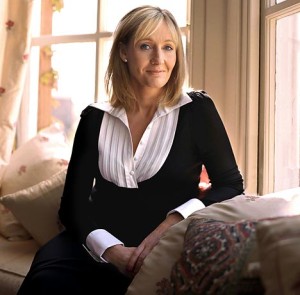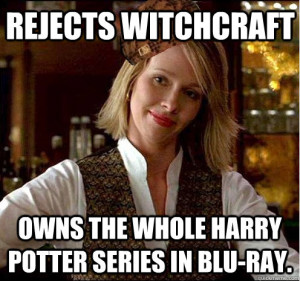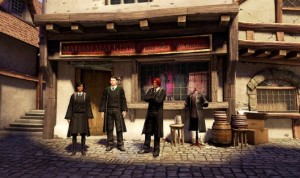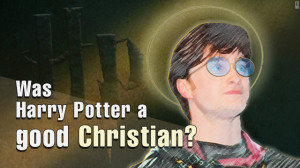The Magic that Gathers
By Jin Lovelace; team writer and videographer
So with Harry Potter finally touching down upon the Home community and the hype behind the product, it was a surprise to recently hear some interesting topics that aroused my curiosity, and led to this article.
One of the main topics that I’ve been viewing in the real world (and on the news media) is of how the Potter brand is accused of being “anti-religious” and advocating witchcraft. The statements can be extreme, and provocative. There are obviously some people who are seriously offended by Harry Potter.
Granted, I didn’t expect for a moment to see reports that children have used spells to rob some bank, or that a Burger King employee had been whacked into a coma by rabid Harry Potter fans with magic wands. As humorous as that may sound, I’m being quite serious here.
 Now to be honest, I’ve never watched any Harry Potter films, or even read any of the books. Granted, I know about the author, J. K. Rowling, and I respect her brilliant merger of the fantasy genre with the classic “school story”. In fact, she is an intriguing, highly lauded woman for whom I have the utmost respect, as she has inspired me in so many ways. But literally, I don’t know her work at all, aside from seeing bits and pieces of movie previews, so I can’t produce a comprehensive perspective on what the series is about. I do find it funny that when I state this to any of my friends who are fans of the novels and movie series, they assume my ignorance of it is due to my religious background.
Now to be honest, I’ve never watched any Harry Potter films, or even read any of the books. Granted, I know about the author, J. K. Rowling, and I respect her brilliant merger of the fantasy genre with the classic “school story”. In fact, she is an intriguing, highly lauded woman for whom I have the utmost respect, as she has inspired me in so many ways. But literally, I don’t know her work at all, aside from seeing bits and pieces of movie previews, so I can’t produce a comprehensive perspective on what the series is about. I do find it funny that when I state this to any of my friends who are fans of the novels and movie series, they assume my ignorance of it is due to my religious background.
Yes, I’m a religious person with spiritual values. I take great pride on being who I am, and I believe that is something that no one can ever take from me. I am who I am, period. And being a person of faith is part of that.
However, this is not why I have not experienced the Harry Potter phenomenon. In fact, it’s quite simple: I just never had any interest in it.
In an ideal world, violence and sex can be depicted as a very gripping tale, amped up and full of action, or as a timeless classic. We can easily accept such a great smash-mouth classic as “Roadhouse”, or embrace the sensual yet tragic side of “Vanilla Sky”. Not a problem at all, right?
Well, lets look at it from a different angle: how can anyone have no problems taking up arms to shoot a “noob” in the face in their favorite first-person shooter or summon a monster spell to live off their Final Fantasy, but have an issue with a young boy waving a wand among his friends to battle a dark wizard who desires nothing but to wipe out anything and anybody who stands in his way — including Potter?
To dive deeper into the world of Potter (as I understand it), the series’ theme is death. Though some may find it hard to believe that the world of the books is parallel to our real world, I believe that it is. The books and the films have many cultural meanings, from the corruption in the Ministry of Magic to the prejudice against Muggles — themes that resonate clearly in our own world. The main character himself goes through many trials and tribulations on coming of age as a wizard.
All this seems like something that a normal human being goes through.
From my perspective (and as an artist) I find all of this not too hard to grasp. It feels irrelevant to me. I don’t see myself casting any spells any time soon. And if, as some say, the spells are just a metaphor for real-world mastery of skills — the kind of personal growth we all experience — well, why not cut to the chase and talk about the real thing, instead of cloaking it in magic? However, I don’t personally believe that either the books or the films promote witchcraft, and I just don’t understand why it’s exciting so much bigotry in Home.
In fact, I have to admit that my time in the Pottermore public space, trying out the games and collecting my rewards, was rather fun. The space dropped me into a world of magic, transforming me into a beginner Wizard. I felt that to actually experience this world created by one woman whose upbringing formed her character, which is in turn richly ingrained in her stories, and have it translated into Home was just amazing! But could this experience be ruined by those who believe that witchcraft has now arrived in Home, promoting evil? (One wonders where these same critics were when Home got the Magic: the Gathering public space. Maybe they just didn’t notice it.)
 My personal point here, is how can anyone make statements about a subject they have not properly researched? How does Harry Potter impact Home socially? How can we all accept the common gaming and movie genres, which are thoroughly unrealistic, but not a deeply detailed, deeply human fantasy world full of student wizards?
My personal point here, is how can anyone make statements about a subject they have not properly researched? How does Harry Potter impact Home socially? How can we all accept the common gaming and movie genres, which are thoroughly unrealistic, but not a deeply detailed, deeply human fantasy world full of student wizards?
As a Christian myself, I never though this would be something that would rile my household. But to state that an author is promoting something that isn’t there astounds me, especially since she is a Christian herself. Certainly plenty of authors and ministers have pointed out that the Harry Potter novels abound in Christian themes, such as the struggle of good against evil, and the sacrifice of one’s own life for the good of others. I just don’t get it.
Not all people are open-minded enough to peek into the world of Potter. But, speaking for myself, after the research I did for this article, I think it might just be something I could get into.
Share
| Tweet |




 Twitter
Twitter